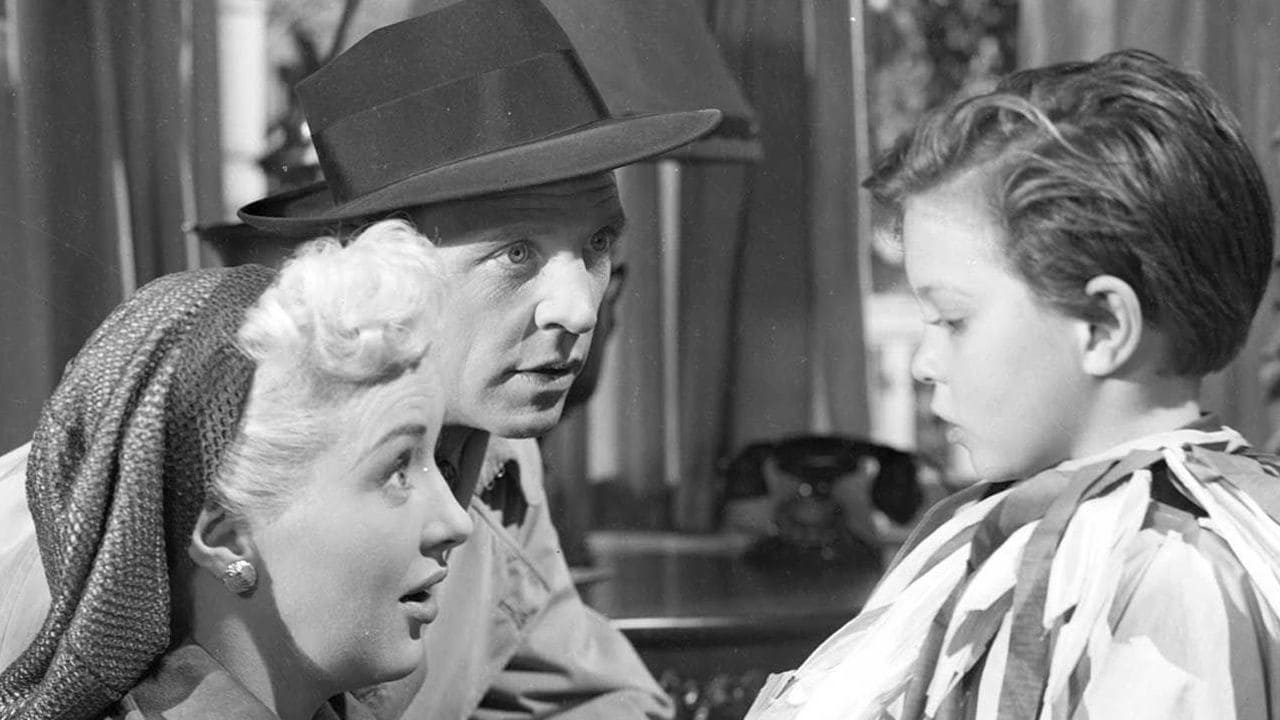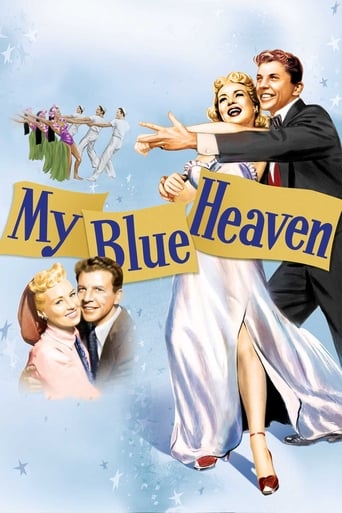



Dreadfully Boring
Absolutely brilliant
This is a tender, generous movie that likes its characters and presents them as real people, full of flaws and strengths.
View MoreMostly, the movie is committed to the value of a good time.
View MoreI'm as much a fan of the musicals of Hollywood's Golden Age as anyone - probably more than most - but this one stumps me.Playing radio husband and wife personalities, Dan Daily and Betty Grable, who inexplicably dance on their radio show, lurch through 90 minutes+ of mediocre songs and dances, melodrama and good ol' 1950's sexist hilarity for no discernible reason.The movie opens with a shot of Grable in her underwear, talking to a man, who we see as the camera pans, is her doctor, who gives her the good news: she's pregnant. She rushes from the office straight onto the stage of her radio show, where she proceeds to tell Dan, live on the air, through a series of vague hints, never uttering the word "pregnant".Cut to a baby shower given by their show-biz cronies during which the mother is all but ignored while the husband is subjected to a series of tasteless jokes regarding his part in the proceedings. Dan of course gets crocked - it's 1950 and everyone drinks like a fish and smokes like a chimney - and Betty has to drive them home. On the way she slams into another car and into a fire hydrant, which is played for a laugh before we discover that Betty is injured. She loses the baby, and a rather unsympathetic doctor tells her it's unlikely that she will ever have another. This is a musical comedy? This plot twist starts the couple on their quest to adopt, but the head of the agency disapproves of show folk - too unreliable. Nevertheless, they hand Betty a baby; then almost immediately snatch it back on the grounds that they are not suitable after all. There goes baby number two.The couple distract themselves by going into television and a series of lame musical numbers that not even Grable and Daily can salvage, all broadcast in brilliant color - in 1950. There is one rather bizarre spoof of the musical "South Pacific" which had opened on Broadway the year before, complete with lines taken directly from the score, and a very bad impersonation by Daily of Ezio Pinza, the Broadway lead. The question is, "Why?" The show was not brought to the screen for 8 more years, and one has to wonder just how much of the movie audience had any idea what they were doing.There is a side distraction in the person of a very young Mitzi Gaynor in her first major role, as a predatory dancer on the show with her eye on Dan. When Betty catches them playing house in his dressing room, she takes the attitude that boys will be boys and shows Mitzi the door.Another baby comes and goes - don't ask - and the whole mess ends with the original adoption agency deciding that they can have a baby after all, and Betty discovers that she's pregnant again. Now they have three babies.If you haven't given up long ago, that's their idea of a happy ending.Add a lackluster David Wayne and Jane Wyatt as a poor man's Comden and Green and the wonderful Louise Beavers in the thankless role of yet another maid, and you have a whole that is far less than the sum of its parts.Taken all in all, "My Blue Heaven" is a time capsule that you enter at your own risk.
View MoreThis film really isn't much. The performers are all agreeable, but the real star is the score by Harold Arlen and Ralph Blane. The lost gem is "Halloween", an Arlen waltz performed by Betty Grable, Dan Dailey, and David Wayne. Arlen did not write many waltzes. Only "When the Boys Come Home", "Sunday in Cisero Falls", and "Fancy Free" come to mind. This is a fine waltz with a witty lyric by Blane telling us that Irving Berlin forgot to write a song about "Halloween". "Don't Rock the Boat", Arlen's take on Calypso music, is also a winner. "Friendly Island" is a hilarious send up of Rodgers and Hammerstein's "South Pacific". Blane has never been so archly funny. Dailey even makes fun of Ezio Pinza's singing in this number. Aside from these numbers, "Mother Wore Tights" and "Call Me Mister" are superior Grable-Dailey films. Wayne gives us some comedy, but it is not enough to make the film sparkle.
View MoreMy Blue Heaven which starred Dan Dailey and Betty Grable are a happy show business couple who started in vaudeville and now are going into that happy new medium television. This was one of the first films that dealt with the phenomenon of television. As Dailey says during the course of the film, right now only Milton Berle and Howdy Doody are in it, the field is wide open.Dailey and Grable are a happy couple, but they'd even be happier with a child, in fact Betty loses a baby almost at the beginning of the film. Friends and sponsors, David Wayne and Jane Wyatt suggest adopting because three of their six are adopted. The rest of the film is a lighter treatment of the themes from A Penny Serenade. Things go a lot happier for Dailey and Grable than they did for Cary Grant and Irene Dunne.Because they are a musical performing couple Grable and Dailey get a whole lot of numbers and there's even a few tossed in for Mitzi Gaynor who was doing her second film. What a pity she came along as late as she did, she would have been a Grade A star in the Thirties. Gaynor plays an eager young understudy who'd just as soon Grable stay out on maternity leave.Other than the title song, there's nothing terribly memorable in the score that Harold Arlen and Ralph Blane wrote for My Blue Heaven. Of course very few songs are as memorable. Until Bing Crosby introduced White Christmas in Holiday Inn, My Blue Heaven was the largest selling song in history with Gene Austin's version topping the charts.My Blue Heaven is a pleasant enough diversion. Grable and Dailey work well as a team together, you'll enjoy them.
View MoreCan't remember much about the movie, except my parents were a little disgusted at some of the dialogue. One that stands out: Grable and Dailey, a married couple, announced she was pregnant.At a party (or something)where they announced the news, somebody said something like, "Well, we had better go because they probably want to be alone."To which David Wayne, in whatever role he was playing, said, "Listen, if what these two kids said is true, they've been alone."That was one pretty risque line for 1950. Would that dialogue today were as tame as that.
View More